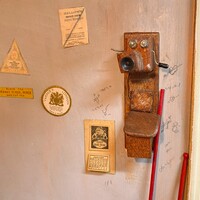The Country Store, History
As far back as the 18th century, rural Americans relied heavily on the country store daily for their shopping needs, and it held several benefits for customers. Not only was it a business center for the community, but a social center in which people learned the news and swapped stories of local and national significance.
According to historian William A. Russ Jr. in his 1950 article, “The Country Store of Half a Century Ago,”
The saying which comes down to us–that the general store sold everything from a gatling gun to a needle–suggests the multitudinous stock it carried. A country merchant was literally a Jack-of-all-trades…
Mrs. Fisher’s replica shows a variety of dry goods in the store: an assortment of cereal, flour, sugar, cans of baked beans, soups, mustard, and other condiments.
Her inclusion of specific brands within her model helps to draw up that nostalgic tone. We see brands like Gerber’s Cereal, Heinz Baked Beans, and Campbell’s tomato soup, all brands that are still around today. And because these brands are still thriving today, we can recognize the enduring legacy of the products as well as the location where they were sold.
We see in the corner an area that was designated as the county post office in which people would receive and pick up their mail, and on the opposite wall, Fisher erects the beloved payphone, a token that one reviewer noted— looks as if it was “probably used by the entire neighborhood” (Hobbyist with a Heart).
There are even little messages taken in pencil on the wall beside the phone, all crafting a lived in, communal tone to the room. All of this paints a picture of how popular and busy the Country Store was on a daily basis: Americans needed it to survive.
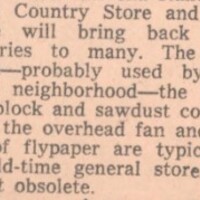
The newsclipping speaks of the inclusion of a community phone in Fisher's Country Store.
Transcription:
“The Country Store and Post Office will bring back fond memories to many. The wall phone—probably used by the entire neighborhood—the chopping block…and spirals of flypaper are typical of the old-time general store now almost obsolete.”
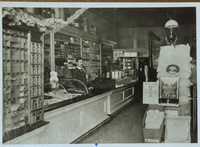
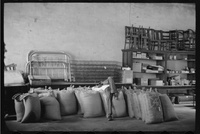
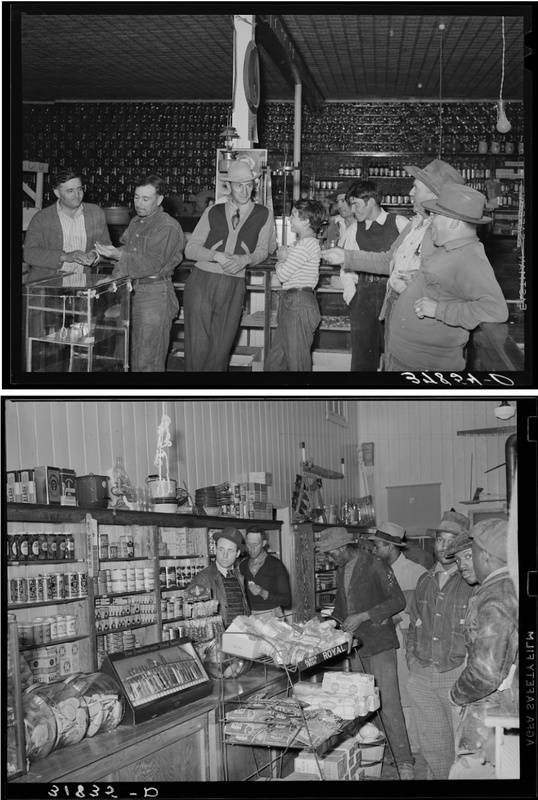
![<a href="/omeka/items/browse?advanced%5B0%5D%5Belement_id%5D=50&advanced%5B0%5D%5Btype%5D=is+exactly&advanced%5B0%5D%5Bterms%5D=A+Zoom+Capture+of+the+Shelves+Lined+with+Goods+in+the+Country+Store%2C+created+by+Mrs.+Fisher%2C+%5Bca.+1940s-1950s%5D">A Zoom Capture of the Shelves Lined with Goods in the Country Store, created by Mrs. Fisher, [ca. 1940s-1950s]</a> <a href="/omeka/items/browse?advanced%5B0%5D%5Belement_id%5D=50&advanced%5B0%5D%5Btype%5D=is+exactly&advanced%5B0%5D%5Bterms%5D=A+Zoom+Capture+of+the+Shelves+Lined+with+Goods+in+the+Country+Store%2C+created+by+Mrs.+Fisher%2C+%5Bca.+1940s-1950s%5D">A Zoom Capture of the Shelves Lined with Goods in the Country Store, created by Mrs. Fisher, [ca. 1940s-1950s]</a>](https://omeka.wilkes.edu/omeka/files/fullsize/6aaf608a9fbecaac01cdf3936f05286c.jpg)
![<a href="/omeka/items/browse?advanced%5B0%5D%5Belement_id%5D=50&advanced%5B0%5D%5Btype%5D=is+exactly&advanced%5B0%5D%5Bterms%5D=Zoom+Captures+of+the+Name+Labels+for+the+Items+in+the+Country+Store%2C+created+by+Mrs.+Fisher%2C+%5Bca.+1940s-1950s%5D">Zoom Captures of the Name Labels for the Items in the Country Store, created by Mrs. Fisher, [ca. 1940s-1950s]</a> <a href="/omeka/items/browse?advanced%5B0%5D%5Belement_id%5D=50&advanced%5B0%5D%5Btype%5D=is+exactly&advanced%5B0%5D%5Bterms%5D=Zoom+Captures+of+the+Name+Labels+for+the+Items+in+the+Country+Store%2C+created+by+Mrs.+Fisher%2C+%5Bca.+1940s-1950s%5D">Zoom Captures of the Name Labels for the Items in the Country Store, created by Mrs. Fisher, [ca. 1940s-1950s]</a>](https://omeka.wilkes.edu/omeka/files/fullsize/41b48b9ca97ee1d119120bc348d5c51d.jpg)
![<a href="/omeka/items/browse?advanced%5B0%5D%5Belement_id%5D=50&advanced%5B0%5D%5Btype%5D=is+exactly&advanced%5B0%5D%5Bterms%5D=A+Zoom+Capture+of+the+Gerber+Cereal+in+the+Country+Store%2C+created+by+Mrs.+Fisher%2C+%5Bca.+1940s-1950s%5D">A Zoom Capture of the Gerber Cereal in the Country Store, created by Mrs. Fisher, [ca. 1940s-1950s]</a> <a href="/omeka/items/browse?advanced%5B0%5D%5Belement_id%5D=50&advanced%5B0%5D%5Btype%5D=is+exactly&advanced%5B0%5D%5Bterms%5D=A+Zoom+Capture+of+the+Gerber+Cereal+in+the+Country+Store%2C+created+by+Mrs.+Fisher%2C+%5Bca.+1940s-1950s%5D">A Zoom Capture of the Gerber Cereal in the Country Store, created by Mrs. Fisher, [ca. 1940s-1950s]</a>](https://omeka.wilkes.edu/omeka/files/fullsize/68d5dfda569197a48962a53cd3acb0bc.jpg)
![<a href="/omeka/items/browse?advanced%5B0%5D%5Belement_id%5D=50&advanced%5B0%5D%5Btype%5D=is+exactly&advanced%5B0%5D%5Bterms%5D=Zoom+Capture+of+the+Goods+and+Name+Brands+in+the+Country+Store%2C+by+Mrs.+Fisher%2C+%5Bca.+1940s-1950s%5D">Zoom Capture of the Goods and Name Brands in the Country Store, by Mrs. Fisher, [ca. 1940s-1950s]</a> <a href="/omeka/items/browse?advanced%5B0%5D%5Belement_id%5D=50&advanced%5B0%5D%5Btype%5D=is+exactly&advanced%5B0%5D%5Bterms%5D=Zoom+Capture+of+the+Goods+and+Name+Brands+in+the+Country+Store%2C+by+Mrs.+Fisher%2C+%5Bca.+1940s-1950s%5D">Zoom Capture of the Goods and Name Brands in the Country Store, by Mrs. Fisher, [ca. 1940s-1950s]</a>](https://omeka.wilkes.edu/omeka/files/fullsize/77d58645970229994e9ad805359c5510.jpg)
![<a href="/omeka/items/browse?advanced%5B0%5D%5Belement_id%5D=50&advanced%5B0%5D%5Btype%5D=is+exactly&advanced%5B0%5D%5Bterms%5D=A+Zoom+Capture+of+the+Post+Office+Window+in+the+Back+of+the+Country+Store%2C+created+by+Mrs.+Fisher%2C+%5Bca.+1940s-1950s%5D">A Zoom Capture of the Post Office Window in the Back of the Country Store, created by Mrs. Fisher, [ca. 1940s-1950s]</a> <a href="/omeka/items/browse?advanced%5B0%5D%5Belement_id%5D=50&advanced%5B0%5D%5Btype%5D=is+exactly&advanced%5B0%5D%5Bterms%5D=A+Zoom+Capture+of+the+Post+Office+Window+in+the+Back+of+the+Country+Store%2C+created+by+Mrs.+Fisher%2C+%5Bca.+1940s-1950s%5D">A Zoom Capture of the Post Office Window in the Back of the Country Store, created by Mrs. Fisher, [ca. 1940s-1950s]</a>](https://omeka.wilkes.edu/omeka/files/square_thumbnails/79a2e4783800bb07911a1ffd3cc8c486.jpg)
